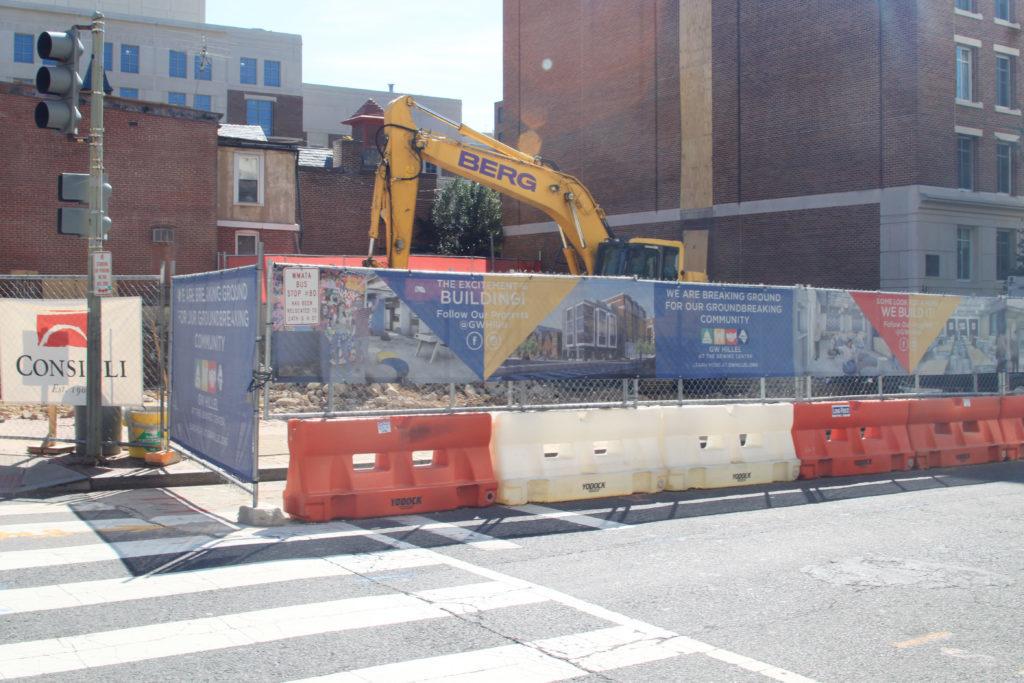GW ranks in the top 25 percent among District neighborhoods for the most “sidewalk obstructions,” according to a Greater Greater Washington analysis released last week.
The Foggy Bottom Campus is ridden with 333 sidewalk obstructions, ranking No. 28 out of 111 neighborhoods in D.C. for issues ranging from a crack in the road to construction, the analysis states. Community members said closed-off sidewalks have forced them to walk in the street and risk being hit by cars.
Sidewalks are blocked off on H and 23rd streets while the GW Hillel building is under construction, and outside of 2100 Pennsylvania Ave., which Boston Properties is demolishing and redeveloping into a commercial property.
The 1900 block of H Street has been closed off for six years because of an ongoing construction project at the International Monetary Fund. The block is set to open again in the next few weeks, senior and Advisory Neighborhood Commissioner James Harnett announced at a Foggy Bottom and West End ANC meeting Wednesday.
ANC Commissioner Patrick Kennedy said some residents have complained to the ANC about construction areas where project managers closed off sidewalks without creating a pedestrian walkway on the street.
Kennedy said the ANC contacts either the District Department of Transportation or construction project managers if residents complain about a certain sidewalk closure. He said project managers can find solutions to residents’ complaints more efficiently than if ANC members bring the issues straight to DDOT, because managers are more frequently in contact with construction projects.
Kennedy said he most commonly receives complaints from elder residents and people with disabilities who cannot navigate disrupted sidewalks.
“Some of those sorts of things I received complaints about,” Kennedy said. “We try to address them as they come up.”
ANC Commissioner Detrick Campbell said Boston Properties’ construction project at 2100 Pennsylvania Ave. has disrupted his commute from The President apartment complex on I Street. But he said Boston Properties’ agreement to add enhancements to the neighborhood is worth redirecting his route.
Boston Properties will revamp sections of campus, like Pennsylvania Avenue and the crosswalk by Whole Foods, in the next few years as part of its agreement with the University to redevelop 2100 Pennsylvania Ave. and the Residences on the Avenue apartment complex.
“It poses a small inconvenience,” Campbell said. “However, what Boston Properties and GW plan to bring I think is going to be much better.”
University spokeswoman Crystal Nosal said the University has heard “minor concerns” from residents about GW’s sidewalk closures. She declined to say what concerns officials have heard about campus sidewalk obstructions.
“With each closure, the University works extensively with its construction teams to limit these occurrences, as well as with University stakeholders and neighborhood leaders to mitigate any potential impacts,” Nosal said in an email. “This includes outreach when a closure is confirmed as well as updates throughout the closure.”
She said several closures within the campus plan boundaries are not a result of University construction but the result of construction by other bodies, like the U.S. Department of State and the World Bank. Nosal added that Greater Greater Washington’s analysis shows that the rates of sidewalk construction on campus are lower than in areas near campus and in downtown D.C.
In interviews, more than 10 Foggy Bottom residents said cars have almost hit them while they crossed the street because the construction to the GW Hillel building and 2100 Pennsylvania Ave. block crosswalks.
Grant Cohen, a sophomore who lives in Amsterdam Hall, said the construction project has added time to his commute because he can no longer use the crosswalk on 23rd and H streets. He said the construction managers could have closed off a section of H Street for pedestrians to cross through to prevent students from crossing in the middle of the street.
“It’s just inconvenient,” Cohen said. “I just wish there was a sidewalk there to walk across. It would be a lot safer, but hopefully the Hillel building will be done soon.”
Heather Harper, a junior living in Amsterdam Hall, said she has to cross the section of H Street in front of Amsterdam instead of using the sidewalk and “hope” that no cars will come. She said officials should add a temporary sidewalk to help students safely cross the street.
“You have to step out into cars and then look and hope that no cars are coming,” Harper said. “It’s really been sort of concerning.”
She added that the closed-off sidewalk has added time to her daily commute to class because she has to cross both 23rd and H streets, instead of just 23rd Street.
“I wish that they would have just shut down the lefthand lane that’s facing Amsterdam and Hillel and instead just made it a pedestrian lane – that way we could walk without interruption,” Harper said.
Brittany Thomas, a resident at The President apartment complex next to 2100 Pennsylvania Ave., said she feels unsafe crossing the street with her daughter because the construction project prevents them from crossing at the crosswalk.
“When you’re walking, when you’re about to cross there, you can’t see what’s coming,” Thomas said. “In order for you to actually see what’s coming, you have to physically step out into the whole street.”





